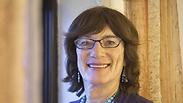
Former Orthodox educator builds life as woman in Jerusalem
Transgender activist who ran Chabad educational center preaches message of truth, tolerance while leading lifestyle as devout Orthodox Jew.
Twenty-five years ago, Yiscah Smith was a man who ran a Jerusalem educational center for Chabad — a religious group that helps bring unaffiliated Jews closer to their faith. These days, she is doing a different sort of outreach — as a transgender activist and educator who preaches a message of truth and tolerance.
The 63-year-old Smith lives an active life in Jerusalem, giving lectures on Judaism, teaching part-time at a local seminary and discussing her book, "Forty Years in the Wilderness: My Journey to Authentic Living."
Her personal journey stands out, even in a country filled with people with stories of spirituality and self-discovery.
"God wants all of us to be honest. And that's really my message of the book, to give inspiration and strength to help people to move past their own inner demons," she said in an interview with The Associated Press.
Raised as Jeffrey Smith in Long Island, she became religious as an adult, joining Chabad in 1975. She married, had six children with her then-wife, and spent time in Israel and the United States before she said she helped run a Chabad visitor center in Jerusalem's Old City from 1985 to 1991.
But all along, she kept a deep secret. Going back to her childhood, she always knew she was a girl.
Smith recalled that as a 5-year-old boy, she was entranced watching her mother put on makeup. Her mother once suggested she instead watch her father shave "because you are a boy."
"It was like, 'I'm a boy? Wait. No. No.' But I didn't say that to her. It was what I felt," she explained.
During her years as a Chabad activist, she said she hated herself.
"Yet I so wanted to live a spiritual life. So I was always making deals. I was making deals with God ... 'I will put on the costume, but please work with me. Help me,'" she said.
Eventually, she parted ways with the movement, divorced, and in 2001, at the age of 50, started a four-year process culminating with surgery that transitioned her into a woman.
She chose the biblical name Yiscah, which she said means to "behold" and to "see into the present more deeply."
During the interview in her small Jerusalem apartment, Smith wore lipstick, a purple dress, encrusted glasses, a large blue necklace and a smaller one with a Star of David. She showed old passport pictures of her bearded former self, before her transition. She declined to discuss her relationship with her children and grandchildren.
Smith still leads a lifestyle of a devout Orthodox Jew, eating only kosher food, refraining from travel on the Jewish Sabbath and praying at the Western Wall — albeit in the section reserved for women.
In the conservative Middle East, Israel is famously tolerant of gays and transgenders. Gays have openly served in Israel's military and parliament. The Supreme Court grants a variety of family rights to gay couples, and gays, lesbians and a transsexual are among the country's most popular musicians and actors. Last year, the country opened a memorial to gays who died in the Nazi Holocaust.
The challenges of living a transgender life have gained awareness through the popularity of Amazon Prime's series "Transparent." The show, which focuses on a man in the process of transitioning to a woman who comes out to his adult children, won two Golden Globes earlier this month.
Despite this tolerance, the conservative world of Orthodox Judaism is not always so accepting, making Smith's openness about her story even more striking.
Shmuel Pappenhym , an ultra-Orthodox educator and commentator, said there is no mention in Jewish texts of the issue of gender changes "because it's a modern thing." He said that many ultra-Orthodox consider it an "abomination" and prefer not to think about it because it is difficult for them to fathom.
But Rabbi Dalia Marx, an expert of liturgy and biblical literature at the Hebrew Union College-Jewish Institute of Religion, which is affiliated with the liberal Reform movement, said gender stereotypes are not always clear in the Bible.
"The liberal streams (of Judaism) acknowledge the fact that maybe some people are born in the wrong skin, and they have the right and maybe the duty to search for their own identity," she said. "Then the Jewish religion and Jewish leaders have to help them find their way into this new reality that they created for themselves."
Chabad did not immediately return a message from the AP seeking comment.
Smith said she has no regrets about her decision.
"I couldn't change my soul ... There is no surgery for your soul like a heart transplant," she said. "But you can get a different body, and thank God today. One-hundred years ago, I don't know what I would have done."










